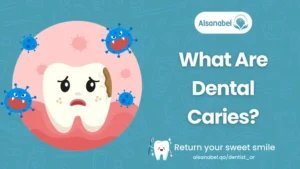
Tooth decay, also known as caries teeth, is one of the most common dental problems affecting individuals of all ages. It occurs when bacteria in the mouth produce acids that erode tooth enamel, leading to the formation of tooth cavities. If left untreated, dental caries symptoms can worsen, resulting in pain, infection, and even tooth loss.
Fortunately, tooth decay is largely preventable with proper oral hygiene, dietary choices, and routine dental care. Understanding how to prevent caries is essential for maintaining strong, healthy teeth and avoiding costly dental procedures. In this article, we will discuss the causes of tooth cavities, how they develop, symptoms to watch for, and the best ways to protect your teeth from decay.
What Are Dental Caries?
What are dental caries?
Dental caries, commonly referred to as cavities or tooth decay, is the destruction of tooth enamel caused by bacterial activity in the mouth. Enamel is the hard outer layer of the tooth that protects the underlying dentin and pulp. When bacteria break down food particles, they produce acids that gradually erode enamel, leading to holes or tooth cavities.

Tooth decay is a progressive condition, and if not treated early, it can penetrate deeper layers of the tooth, causing pain, sensitivity, and potential infection.
How Do Cavities Develop in Teeth?
How do cavities develop in teeth?
The development of tooth cavities follows a series of stages:
1. Plaque Formation
Plaque is a sticky film composed of bacteria, food particles, and saliva. If plaque is not removed through proper brushing and flossing, it accumulates on the tooth surface, particularly around the gumline and in hard-to-reach areas.
2. Enamel Erosion
The bacteria in plaque feed on sugars and starches from food, producing acids that gradually dissolve the minerals in tooth enamel. Over time, this demineralization weakens the enamel, making it more susceptible to decay.
3. Formation of Small Cavities
As enamel continues to erode, small holes begin to form in the tooth surface. At this stage, cavities may not cause noticeable symptoms, making regular dental checkups essential for early detection.
4. Decay Reaches the Dentin
Once decay penetrates the enamel, it reaches the dentin, the softer layer beneath. Since dentin is less dense than enamel, decay progresses more rapidly at this stage, often leading to tooth sensitivity to hot, cold, or sweet foods.
5. Infection in the Pulp
If left untreated, decay can reach the pulp, the innermost part of the tooth that contains nerves and blood vessels. This can cause severe pain, infection, and swelling. In advanced cases, a root canal may be necessary to save the tooth, or extraction may be required.
Dental Caries Symptoms: How to Identify Tooth Decay
Recognizing dental caries symptoms early can help prevent further complications. Below are the most common signs of caries teeth:
1. Tooth Sensitivity
- Increased sensitivity to hot, cold, or sweet foods and beverages.
- A sharp pain when biting or chewing.
2. Visible Holes or Pits in Teeth
- Small, dark spots or holes in the enamel.
- A rough or uneven tooth surface.
3. Toothache or Pain
- Persistent or intermittent pain, particularly when eating.
- Discomfort that worsens at night.
4. Bad Breath or Unpleasant Taste
- A persistent bad odor, even after brushing.
- A foul taste caused by bacterial activity in decayed teeth.
5. Swelling or Pus Formation
- In advanced stages, gum swelling or pus near the affected tooth may indicate an abscess, requiring immediate dental attention.
If any of these dental caries symptoms are present, scheduling a dental appointment is essential for proper diagnosis and treatment.
What Foods Cause Dental Caries?
What foods cause dental caries?
Certain foods and beverages contribute to tooth cavities by promoting bacterial growth and acid production. Below are some of the worst offenders:
1. Sugary Foods and Drinks
- Candy, cookies, cakes, and sugary snacks
- Soda, fruit juices, and energy drinks
2. Starchy Foods
- White bread, pasta, chips, and crackers
- Processed foods with high starch content
3. Acidic Foods and Beverages
- Citrus fruits like lemons and oranges (in excessive amounts)
- Vinegar-based foods, pickles, and carbonated drinks
4. Sticky and Chewy Foods
- Caramel, dried fruits, and gummy candies
- Sticky foods that remain on the teeth for extended periods
Minimizing these foods and opting for healthier alternatives, such as fiber-rich fruits and vegetables, can significantly reduce the risk of caries teeth.
Can Tooth Decay Be Reversed Naturally?
Can tooth decay be reversed naturally?
In its early stages, tooth decay can sometimes be reversed through remineralization. This process involves replenishing lost minerals in enamel before a cavity fully forms.
1. Increase Fluoride Intake
- Fluoride strengthens enamel and helps reverse minor decay.
- Use fluoride toothpaste and drink fluoridated water.
2. Eat Calcium-Rich Foods
- Dairy products like milk, cheese, and yogurt support enamel remineralization.
- Leafy greens and almonds also provide essential minerals for strong teeth.
3. Avoid Frequent Snacking
- Frequent snacking increases acid exposure, weakening enamel.
- Rinse the mouth with water after eating to neutralize acids.
4. Use Xylitol Products
- Xylitol is a natural sweetener that reduces harmful bacteria in the mouth.
- Chewing xylitol gum after meals can help prevent decay.
While these steps can help in the early stages of decay, once a cavity forms, professional treatment is required.
How to Prevent Caries: Best Practices for Healthy Teeth
How can I prevent cavities?
Preventing caries teeth requires a combination of good oral hygiene, a healthy diet, and regular dental care.
1. Brush and Floss Daily
- Brush twice a day with fluoride toothpaste.
- Floss once a day to remove food particles between teeth.
2. Use Mouthwash
- An antibacterial mouthwash helps kill bacteria and reduce plaque buildup.
3. Limit Sugary and Acidic Foods
- Reduce consumption of sugary and acidic foods that promote tooth decay.
- Drink plenty of water to rinse away food debris and acids.
4. Get Regular Dental Checkups
- Visit the dentist every six months for cleanings and exams.
- Early detection of dental caries symptoms prevents further complications.
5. Consider Dental Sealants
- Dental sealants are protective coatings applied to molars to prevent cavities.
- Sealants are especially beneficial for children and teenagers.
Frequently Asked Questions About Tooth Decay

1. What are dental caries?
Dental caries, or cavities, are areas of tooth decay caused by bacterial acids breaking down enamel.
2. How do cavities develop in teeth?
Cavities develop when plaque bacteria produce acids that erode enamel, leading to holes in the teeth.
3. What foods cause dental caries?
Sugary, starchy, and acidic foods contribute to tooth cavities, including candy, soda, bread, and citrus fruits.
4. Can tooth decay be reversed naturally?
Early-stage decay can sometimes be reversed through fluoride treatment, proper nutrition, and oral hygiene.
5. How can I prevent cavities?
Brushing, flossing, fluoride use, limiting sugar intake, and regular dental checkups are the best ways to prevent caries.
Understanding caries teeth and recognizing dental caries symptoms is crucial for maintaining good oral health. By adopting preventive measures, such as proper oral hygiene, a balanced diet, and routine dental visits, individuals can effectively reduce their risk of developing tooth cavities. If tooth decay is detected early, it can be managed and treated before it leads to more severe complications.
%20(2).jpg)
